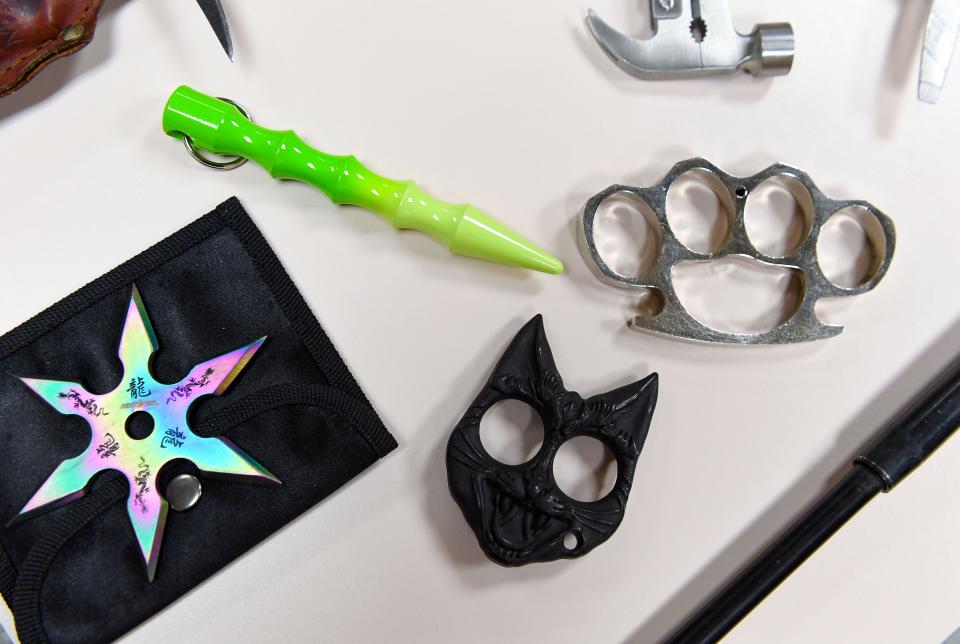'Self-defense keychains' are rising in popularity. But are they legal in Delaware?
They're popular on TikTok and come in any color or pattern you can imagine − pink, cheetah print, blue and green with rhinestone embellishments. They're also intended to keep you safe.
These so-called "self-defense" or "safety" keychains have been making the rounds for several years now, though appear to have more recently gained in popularity.
They contain everything from a whistle and a window-breaker to a mini canister of pepper spray, along with a "personal alarm" that looks like a key FOB but emits a high-pitched noise to draw attention. Some even have portable hand sanitizer and bottle openers.
But others go a step further in the safety realm, offering "cat ear knuckles," which are also called stabby-cat keychains. Kubotans, or mini batons/self-defense sticks, are also sometimes added.

While there's little debate about whether the former items are legal to carry in Delaware, the latter are more questionable − at least if you're carrying it concealed in a purse or hidden another away.
So why is this? It all has to do with what Delaware considers a "deadly weapon" or "dangerous item" − and the permit required to carry them concealed.
RELATED: Unique, wacky items TSA allows travelers to bring on planes, including axes and live fish
What's a 'deadly weapon' in Delaware?
Many first think of a firearm when they hear deadly weapon, and guns certainly do fall into this category.
But according to Delaware law, a deadly weapon is also a: bomb, knife "of any sort (other than an ordinary pocketknife carried in a closed position)," switchblade, metal knuckles (also known as brass knuckles), slingshot, razor, bicycle chain or ice pick.
Additionally, billy clubs − or baton-like weapons − blackjacks, which are small hitting instruments, and bludgeons (also known as maces) are considered deadly weapons.
"Dangerous instrument" means "any instrument, article or substance which, under the circumstances in which it is used, attempted to be used or threatened to be used, is readily capable of causing death or serious physical injury," Delaware law says.
"Disabling chemical sprays" such as mace, tear gas or pepper spray, as well as "electronic control devices" such as a Taser are also considered to be "dangerous instruments" − though chemical sprays are unique (for reasons we'll get to below).
So can I carry a deadly weapon or 'dangerous instrument'?
The short answer is yes, you can generally carry deadly weapons or dangerous instruments in the open − with some caveats.
Those who are defined as "persons prohibited" are, as the law says, prohibited from buying or possessing these items.
While most people should know when they're a prohibited person, these are people who have been convicted of a felony, a "crime of violence involving physical injury to another person," or any misdemeanor crime of domestic violence, as well as certain other crimes.
It also includes people who have been involuntarily committed to a hospital for a mental condition or found not guilty by reason of insanity or guilty but mentally ill, unless they can demonstrate that they're "no longer prohibited from possessing a firearm under Delaware law." (The law is confusingly written, given it refers to all deadly weapons but suggests that restoration of possession is limited to firearms).
If you don't fall into the prohibited person category, you can generally possess and carry a deadly weapon or dangerous instrument, depending on the locale. But it has to be carried openly and not in your pocket, purse, center console of a car or any other hidden area or compartment.
To carry concealed, be it a firearm or anything else defined under Delaware law, you need a permit.
(With or without a permit, Capitol Police, for example, probably wouldn't let you into a courthouse with any of these items, given lighters often aren't even allowed in).
But you said chemical sprays were unique?
Though chemical sprays are considered a "dangerous instrument," they are specifically exempt from the carrying concealed dangerous instrument statute.
This means they can be kept in a pocket or purse or elsewhere out of sight without a permit.
Additionally, an affirmative defense to a charge of carrying a concealed dangerous instrument − which does not apply to carrying a concealed deadly weapon − is that a person carried said instrument "for a specific lawful purpose and that the defendant had no intention of causing any physical injury or threatening the same."
This is a lot. Can you give me a shorter, yes or no answer?
TL;DR: Yes, "self-defense keychains" are legal in Delaware, but you should probably leave the cat ear knuckles or Kubotans off, unless you plan to carry it in the open 100% of the time.
Got a story tip or idea? Send to Isabel Hughes at ihughes@delawareonline.com. For all things breaking news, follow her on X at @izzihughes_
This article originally appeared on Delaware News Journal: 'Self-defense keychains' are popular. But are they legal in Delaware?

